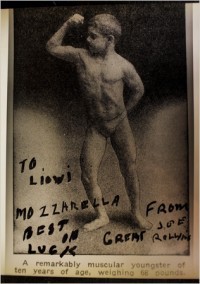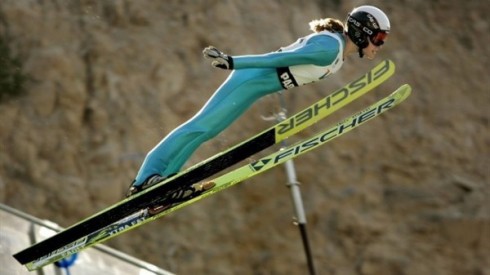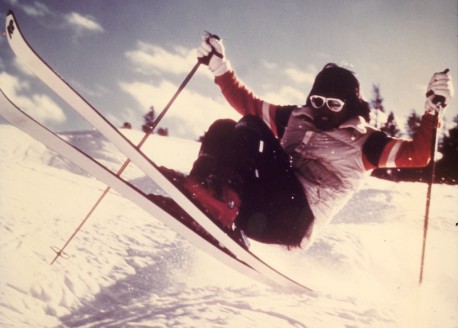Zachary Woolfe: Another Long Vampire Weekend
by Zachary Woolfe

It’s easy to know that a band is good, and harder to know what they’ll mean for people. In 2006, I knew, as did a bunch of Columbia students and some folks on the Internet, that Vampire Weekend was good. I knew this only because I happened, at the time, to be dating a friend of two of the band’s members. In this capacity I would go to their shows, one of those relationship tasks that would have been pretty annoying if the band didn’t put on really good shows.
By the time their first album came out in January 2008, that boyfriend and I had long since broken up, and Vampire Weekend had begun to mean something to a whole lot more people-even to represent a minor moment. It feels like a long time ago, but things were good that year. New York City was in bloom and still working and building, and we, by which I mean its young people, felt in control.
We were set on taking the country back (remember how excited we were about that election?) and we were listening to Vampire Weekend, a crystal-clear sound, clean and clever and certain, that virtuosically combined every signifier of young New York life-”spilled kefir on your keffiyeh”-and captured how smart, how fun, how ironically sincere we knew we were.
They were a fine example of that classic New York dream, that this is actually a place where four kids-without real connections but with talent and hard work-can arrive and end up being rock stars. But theirs wasn’t the disruptive aesthetic of the beats or punks. It was instead an evocation of New York in the Internet era, a place where even the art values order and coherence and good sense. The songs pretended to be conflicted, the poses vulnerable-”The Kids Don’t Stand a Chance” even seemed, as explicitly as Vampire Weekend lyrics get, to criticize the investment banks and consulting firms that had seduced their, our, friends. But the ease and capaciousness of the lyrics’ references, the casualness of the music’s appropriations, made clear that this was music about feeling good about feeling powerful.
And powerful was what we wanted to feel. Vampire Weekend had the the sound of confidence-the confidence that, with Wikipedia open on our browsers, we could talk about Lil Jon and Chinese commodity deals one after the other, and with equal authority. “As a young girl/ Louis Vuitton/ With your mother/ On a sandy lawn”: their lyrics were like a Nancy Meyers movie made just for us, permitting us simultaneously to have and to feel superior to a fantasy of wealth and coolness. Vampire Weekend meant something to us because, seemingly effortlessly rich and knowing, they meant everything that we’d been promised about New York, about the future. There’s a novel in which one character says to another, “How nicely you talk; I love to hear you. You understand every thing.” That was Vampire Weekend. They understood every thing.
Of course, since January, 2008, a lot has changed. The assumptions we had about the future and about New York, the contracts we thought existed, now seem silly. Things aren’t secure; jobs aren’t there; where we wanted certainty, we got compromise; there’s been a halt in the building of all those Brooklyn condos leading the gentrification that the band both parodied and epitomized.
Into this new environment-another January, two years later-arrives Contra, the band’s second album. “Here comes a feeling you thought you’d forgotten,” goes the catchphrase of the opening track. Everything has changed, but Vampire Weekend remains stubbornly the same, still singing about college girls in intricate, quasi-inscrutable lyrics set to hand-clappy syncopated beats. There’s still the same virtuosity; they’re the same, but bigger-expansive where the first album was intimate-and even, on “Giving Up the Gun,” a little light-techno-ish.
It’s as if the band is determined to exaggerate everything, right or wrong, that’s been said about it. Their first album drew endless comparisons to Paul Simon, whose lyrics were also enigmatic and whose sound at times also drew on “world music.” These comparisons rang a bit false last time, but the new album really does often sound similar to Graceland; the ecstatic horns on “Run” descend directly from “You Can Call Me Al.” If that’s not 80s enough for you, they’ve also thrown in a lot of synth beats for good measure. (Is that “Walk Like An Egyptian” casting its shadow over “California English”?) And those infamous Afropop riffs, which give the band its fundamental sonic character but got it widely tagged as semi-racist, are if anything more omnipresent than on the first album.
But an exaggerated, inflated sameness feels irrelevant when so much has changed. The cleverness that was so dazzling on the first album is now a little tiresome, as in the lines from “California English” that give Contra its name: “Contra Costa, Contra Mundum, contradict what I say/ Living like the French Connection, but we’ll die in L.A.” (One of the conceits of the album is that it was inspired by, and largely recorded in, California.) And while the murmurs of racism surrounding the first album were always ridiculous, a second helping of similar beats is wearying.
Their big, shiny new album stands there like one of those big, shiny, half-built condo buildings in Williamsburg, full of empty fridges waiting to be filled with the Aranciata sodas and kefir yogurt drinks that populate the lyrics. Both the album and the buildings look strange after the disappointed certainties of the past couple of years, the frustrated promises. It’s an context in which the beautiful parts of the album are almost bizarrely moving. The rushing horns of “Run”; the precise, melancholy strangeness of “Taxi Cab”; the first time the backup vocals come in in “Horchata” (but not any of the times after that): Vampire Weekend is still capable of understanding every thing, but that’s not as reassuring as it was.
It is entirely possible, and even likely, that my date to the high school prom was the inspiration for some of the songs on Vampire Weekend’s debut album. After all, that’s the deal, right? You date a songwriter, the love songs are about you? In any case, the timing checks out. I only tell you this because this girl-my prom date-happened to be, for a few years, a source of overwhelming, almost scary certainty and authority in my life. There were years after we stopped talking that I missed her, but wasn’t that some time ago now.
Zachary Woolfe writes about culture right here and for the New York Observer.
New Jersey Is For Sick Stoners
The New Jersey legislature approved a bill legalizing medical marijuana in the state. The bill’s passage caps a lame duck legislative session which recently saw the failure of a measure to allow marriage equality in the state, making for what Andrew Sullivan would call “a mixed bag.”
The Last Of The Great New York Strongmen

“He was one of the last links to the old strongman days of Coney Island. Coney Island was the training ground for strongmen. He was one of the best.”
There’s something about the story of Joe Rollino that seems to resonate with everyone I’ve spoken to this morning. The 104-year-old Rollino died yesterday after being struck by an automobile while on his morning walk. Rollino-”a longtime member of the Association of Oldetime Barbell and Strongmen”-was considered one of the strongest men who ever lived, and swam in the frozen waters of the Atlantic well into his golden years. On his 103rd birthday, he bent a quarter with his teeth. And there’s more.
Mr. Scarcella, like many of those who knew Mr. Rollino, has a Joe Rollino story, or several Joe Rollino stories. And though some of them can be neither confirmed nor refuted, they get told and retold and told again, because they are too good not to. Mr. Scarcella heard that one winter in the 1950s, Mr. Rollino recovered the bodies of two people who drowned in Prospect Park, because the police did not have the necessary protective equipment and it was too cold for anyone else to jump in and bring them to the surface.
Still active at 104, it took a minivan to bring him down.
Nixon Speaks

“When I compare the monstrosity of Lincoln Center with the Academy of Music in Philadelphia, I realize how decadent the modern art and architecture have become.”
-Recently released documents from the Richard Nixon collection show the 37th president to have been something of an aesthete, and not actually wrong about everything.
Deitch Speaks
“I feel that what I’ve been doing at Deitch Projects is in a way running my own private institute of contemporary art. I’ve just been using the market system to support it rather than contributions to support it.”
–Jeffrey Deitch explaining why his gallery is just like the museum he’s going to be running.
A Message from Harold Ford

Oh hi. I’m Harold Ford.
There are some things you should know about me.
I write in suspiciously New York Post-like paragraphs of one sentence in length.
And I do it very declaratively.
Was that a word? Sure. Is anything I’m writing making sense? You know it.
Anyway. Even though no one has ever seen me, I have been living in New York City for at least 36 months now, according to my lawyers, and one time I went to the Odeon.
Here is a pic of me that Steven Rubenstein just took. LOL. Is kinda silly right?
Ok pls pls pls pls write me back okay? And don’t forget: MY NAME IS HAROLD FORD AND I AM A VAMPIRE FOR YOUR ATTENTION.
Paper: Nation's Smokers Half-Lunging It

Who still smokes, the Wall Street Journal wonders this morning. Turns out it’s a bunch of folks. You got your social smokers, your secret smokers, your stress smokers, your emotional smokers, your weight-averse smokers, and your too-afraid-to-quit smokers, apparently. But there is also a new breed of cigarette-enjoyer out there: the intermittent smoker.
Even though the percentage of American adults who smoke has stalled at about 20% in recent years, smokers are smoking fewer cigarettes than they used to (an average of 13 per day, down from 21 in 1980). And a growing proportion of smokers-roughly 25%-don’t smoke every day. One government study found that as many as half of American smokers either don’t smoke daily or smoke fewer than six cigarettes a day….
Researchers used to think light and intermittent smoking was a transitional phase for smokers on their way to quitting or ramping up to a more serious habit. But a few recent studies suggest that it’s a new, stable pattern particularly among young, college-educated smokers. An analysis of smoking patterns during the 1990s, published in the journal Nicotine & Tobacco Research last year, found that 18-to-29-year-olds were twice as likely as those aged 50 to 64 to be nondaily smokers. Many experts expect that pattern to continue.
Those experts warn that even intermittent smoking carries severe health risks, and it also makes you kind of a pussy, because you know what? If you’re gonna smoke, smoke. We don’t need you Johnny-Smoke-Latelies on our rugged little island with your two-stick-a-day habit, bumming from us outside of bars because you “forgot” your “emergency pack” at home. I’m sick of you people. Cigarettes cost more than 50 cents each now. You want cancer? Get it on your own dime. Or, more accurately, five of them.
[There is also a fun, “interactive” quiz which lets you test your nicotine dependency. I scored a 7! Yay!]
Miep Gies, 1909-2010
“I am not a hero. I stand at the end of the long, long line of good Dutch people who did what I did and more — much more — during those dark and terrible times years ago, but always like yesterday in the heart of those of us who bear witness.”
-Miep Gies, who helped to hide the Frank family and saved Anne Frank’s diary after they were taken by the Gestapo, died yesterday at the age of 100.
Remember When "Spider-Man 4" Was A Movie That Was Going To Be Made?

Making for a busy first day on the job, Mike Fleming reports for Deadline|New York (so bi-coastal!) that Spider-Man 4, a movie that just this morning had John Malkovich tapped to play lead villain the Vulture, is now apparently not going to happen at all. And according to a Sony press release just, uh, released, the next Spider-Man movie to come out will be a reboot penned by Jamie Vanderbilt, who most recently wrote Zodiac (and before that, a movie starring Dwayne “The Rock” Johnson and Seann William “The Stifler” Scott), which follows Peter Parker/Spider-Man through his high school days. So, that’s… cool… I guess? Although, if you’ve followed the process of getting this sequel made, this news isn’t all that surprising.
Even the casting update that went all around the internet today wasn’t anything official from Raimi or the studio, but was based on a comment Malkovich made on an Italian TV show early this morning about waiting for another, “final,” draft of the script. This news in itself was pretty surprising considering the rumors that Sony had made clear that, for whatever reason, they didn’t want the Vulture as a villain. This news comes right on the heels of word last week that, because of a lack of a usable script, Spider-Man 4’s 2011 release date was going to be given to Thor instead.
All of this, compounded by the reported the Raimi/Sony infighting during the making of Spider-Man 3-which resulted in a less than awesome movie for what had been an otherwise very awesome franchise-kind of made this abrupt news about no more Raimi Spider-Man 4 a little less abrupt.
The Awl’s Mary HK Choi e-mails us about the proposed reboot: “The new thing is that Sony is bringing it back to Spidey’s high school days for 4, which could be absolutely dreadful or amazing. I thought the MTV cartoon was great for exp but great as a series. I guess it’ll be just after the discovery period… It’s going to be tricky. I hope it’s not Twi-tweeny or they’re just worm-holing it back so they can come out with like 4 more. Man, do you remember Spider-Man 3? [Ed.: Yes, so annoying.] Only one in the franchise I didn’t see more than once. What a steaming shitstain that was. They should bring Gwen Stacy in heavy. James franco is a loss though. He’s magical.”
And the full Sony release:
A decade ago we set out on this journey with Sam Raimi and Tobey Maguire and together we made three Spider-Man films that set a new bar for the genre. When we began, no one ever imagined that we would make history at the box-office and now we have a rare opportunity to make history once again with this franchise. Peter Parker as an ordinary young adult grappling with extraordinary powers has always been the foundation that has made this character so timeless and compelling for generations of fans. We’re very excited about the creative possibilities that come from returning to Peter’s roots and we look forward to working once again with Marvel Studios, Avi Arad and Laura Ziskin on this new beginning,” said Amy Pascal, co-chairman of Sony Pictures Entertainment.
“Working on the Spider-Man movies was the experience of a lifetime for me. While we were looking forward to doing a fourth one together, the studio and Marvel have a unique opportunity to take the franchise in a new direction, and I know they will do a terrific job,” said Sam Raimi.
“We have had a once-in-a-lifetime collaboration and friendship with Sam and Tobey and they have given us their best for the better part of the last decade.This is a bittersweet moment for us because while it is hard to imagine Spider-Man in anyone else’s hands, I know that this was a day that was inevitable,” said Matt Tolmach, president of Columbia Pictures, who has served as the studio’s chief production executive since the beginning of the franchise. “Now everything begins anew, and that’s got us all tremendously excited about what comes next. Under the continuing supervision of Avi and Laura, we have a clear vision for the future of Spider-Man and can’t wait to share this exciting new direction with audiences in 2012.”
“Spider-Man will always be an important franchise for Sony Pictures and a fresh start like this is a responsibility that we all take very seriously,” said Michael Lynton, Chairman and CEO of Sony Pictures. “We have always believed that story comes first and story guides the direction of these films and as we move onto the next chapter, we will stay true to that principle and will do so with the highest respect for the source material and the fans and moviegoers who deserve nothing but the best when it comes to bringing these stories and characters to life on the big screen.”
The studio will have more news about Spider-Man in 2012 in the coming weeks as it prepares for production of the film.
Iced Out: Ski Cross My Heart!
by Katie Baker

“In the United States,” begins something that reads like a high school essay, “the 1960s were a time of revolution, of young people challenging authority and demanding change.” It was during that decade, the writer goes on to note, that “social change and freedom of expression led to new and exciting…
…
…
…skiing techniques.”
(Cripes, is there anything the Boomers aren’t taking credit for?)
That illuminating glimpse into modern history is part of the official Olympics website’s description of freestyle skiing, the umbrella category that comprises aerials, moguls and the Games’ newest “medal discipline”: ski cross.
Ski cross sounds confusingly like cross country skiing but is actually nothing of the sort: the event is most accurately described as being a roller derby on skis. (Some people compare it to short track speedskating, but I don’t understand how that is at all helpful.) In contrast to traditional downhill ski racing, ski cross competitors battle not only the clock but each other, competing in groups of four or six on a man-made track covered in jumps, dips, and hairpin turns.
In late 2006, ski cross was greenlighted for inclusion in the 2010 Games by the IOC, while other events like “curling mixed doubles” and “luge team competition” were denied entry. The most controversial neg, though, went to womens’ ski jumping. “It’s like they’re putting us aside and saying no women allowed,” said then-15 year old Canadian ski jumper Katie Willis. “I don’t think that’s right.”
By the IOC’s current standards, it wasn’t: the bylines mandate that any sport added to the Olympics must have a mens’ and womens’ competition. But ski jumping, having been an Olympic mens’ event since 1924, was not subject to the rule. So an international contingent of womens’ ski jumpers opted to do what any wronged party would: sue.
It was a spirited attempt. The women sued the Vancouver arm of the Olympics Organizing Committee, VANOC, for gender discrimination in direct violation of Canada’s Charter of Rights and Freedoms. B.C. Supreme Court Justice Lauri Ann Fenlon agreed that the women had been victims of discrimination-but by the IOC, a body not subject to the Charter.
In a ruling whose circuitousness would have pleased Joseph Heller, Fenlon found that VANOC did have to abide by the Charter-”an argument that VANOC lawyers [had] vigorously contested”-but that VANOC had a duty to follow IOC decisions, “a situation she confessed was ‘somewhat distasteful’.” (The ski jumpers’ appeal of Fenlon’s decision was turned down a few weeks ago.)
Why did the IOC say no in the first place? The most blunt explanation came from committee president Jacques Rogge: “We do not want the medals to be watered down by too little a pool of very good jumpers.” Ice cold!
You can argue with that rationale if you’d like-I don’t profess to be an expert in the international womens’ ski jumping depth chart-but I do know one thing: you’ve seen one ski jumper in that trademark midair pose, you’ve kinda seen them all. The sport can be a snoozer, especially on TV.

As opposed to, I segue, ski cross! The IOC’s decision to include the sport was largely a reaction to the success of snowboard cross (think roller derby but on snowboards) which made an instant splash in its debut in the 2006 Olympics in Torino. “We’d heard that the television guys were asking, when they saw boarder cross, ‘Do they do this on skis too?’” said Canadian Freestyle Ski Association CEO Peter Judge. “When you hear that query coming from someone paying billions in revenue, you tend to listen to your customer.’’
In the wake of Torino, even stodgy PBS got all, as the kids say, amped:
JEFFREY BROWN: Christine, my son said this new sport of snowboard cross looks like a video game come to life, which you know is a high compliment from a 12-year-old. Tell us more about this sport and its new stars.
CHRISTINE BRENNAN: Well, that’s exactly what the International Olympic Committee wants to hear because they’re looking for that next generation of viewer, Jeff, to be able to try to get them, latch them into the Olympic Games and have them watch for several generations. … But it’s kind of that joy de vive, that freshness of those kids that whiz by you on the slopes when you’re skiing as a recreational skier.
JEFFREY BROWN: It looked to me like some of the young women in that snowboard half pipe were listening to their iPods as they were soaring through the air.
CHRISTINE BRENNAN: Well, trying to interview them is really tough because they kind of walk by and, you know, they have got the headsets in and it’s hard to know, hey, by the way, could you stop and talk for a few minutes, so they’re having a great time. I think visually it’s a terrific thing for the games because it’s not just the old stuff and you bring in a different breed of athlete, you know, the online skating type people.
Presumably she said inline skating, but the world may never know. At any rate, TV audiences loved the sports’ rollicking pace and crashtastic wipeouts, and the footage of American darling Lindsey Jacobellis doing her best impression of a hotdogging wide receiver tripping over himself at the 2-yard line while high-stepping untouched toward the endzone ended up one of the most widely viewed videos on NBC’s website.
If you are one of those people who were enthralled by the minutia of superdelegates or who love to dissect the inner workings of the BCS rankings, you will probably be interested in the Goldberg contraption that is the ski cross Olympic qualifying procedure. I am not one of those people. So I’ll just presume, based on some strong recent World Cup finishes, that the two men who will be representing the US in ski cross will be Daron Rahlves and Casey Puckett, aged 36 and 37 respectively.
I have much to say about the two men, both of whom are former members of the US Alpine ski racing team who came out of retirement to compete in the new event, but in the interest of time and your Twittention I will summarize each one in 140 characters or less:
Rahlves: Most decorated US downhill and Super G skier ever but no Olympic medals; won the World Jetski Championship in 1993; had a ridonkulous crash.
Puckett: Wrote blog post that included the phrase “pull your pants down so that I can see the urine come out of your penis”; had a ridonkulous crash.
Regardless of who qualifies, it’s a well known fact that any Olympic sport worth its weight in gold medals must be accompanied by a scandal. (Creep on creepin’ on, figure skating!) And for ski cross, it’s the clothes.
“The French and the Austrians were just trying to cut corners,” said Puckett in a recent interview when asked about the minor controversy that ensued when those prissy little Euros started icing up the race tracks and wearing tight Lyrca ski-racing suits in lieu of traditional baggier two-piece getups. (The International Ski Federation has since issued guidelines banning one-piece suits and mandating a minimum gap between material and skin, although some worry that its new textile regulations are too vague to be effective.)
It may sound silly, but to a sport seeking to differentiate itself from its stodgy-if-speedy downhill-racing predecessors, the issue is of grave importance. “Skiercross in general is in conflict with itself,” declared Seth Wescott, the reigning snowboard cross Olympic gold medalist and apparent Dali Lama. Fellow snowboard crosser Nate Holland had more aesthetics-minded complaints: “When you add speed suits, it looks like crap.”
Puckett, for his part, referred back to the ancient history of the sport’s early-60s pioneers in making his case.
“The first competitors of ski cross were anti-establishment, big mountain freeriders,” he blogged last year. They “wouldn’t be caught dead in a race suit.”

Previously: Hockey Meat, the Disaster of Whistler Blackcomb and Next Year in Vancouver
Katie Baker writes mostly about sports and weddings and so the Winter Olympics just kind of seemed like the next logical step.
